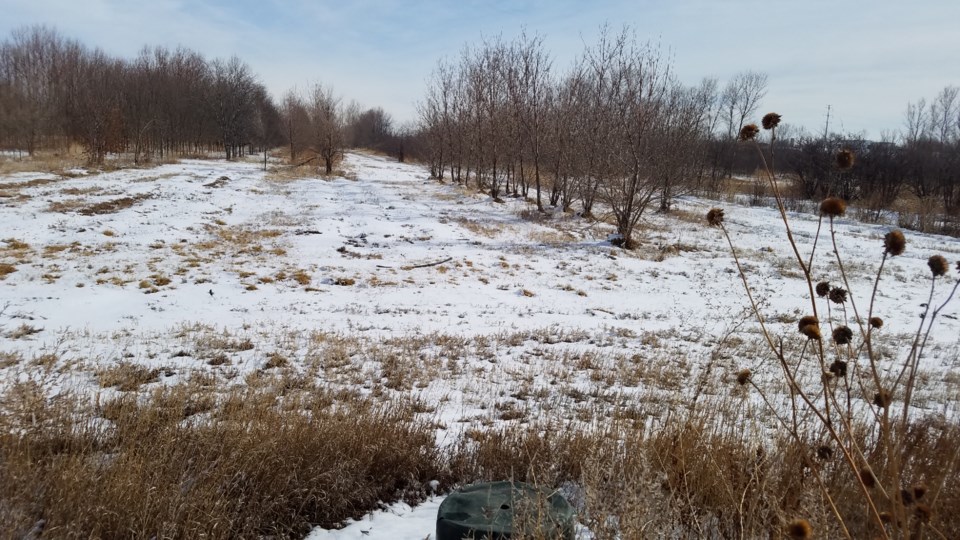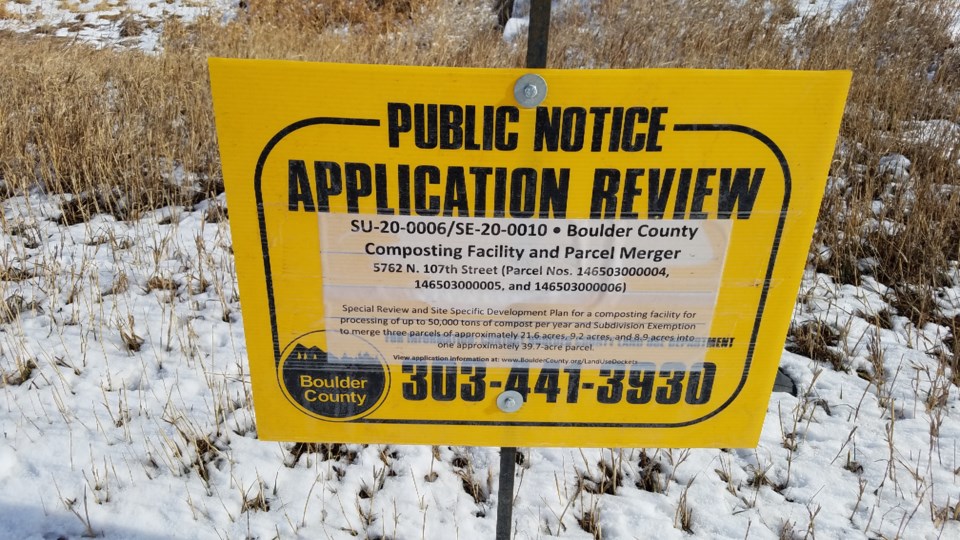The 40-acre abandoned Rainbow Nursery parcel south of Longmont is the target of a legal fight between Boulder County and local landowners who claim the county bought development rights for the formerly protected site so it could build an industrial-scale composting plant.
A lawsuit filed in Boulder County District Court on behalf of three landowners says the county in 1994 used sales and use tax revenue to pay $170,000 to create a conservation easement for the parcel because it was “prime agricultural land.” The sales and use tax funds used in the purchase of the conservation easement can only be used for agricultural or environmental preservation, the suit states.
The suit — which names Lisa E. Battan, Brandon T. White and Victor M. Vargas as plaintiffs — claims the county used the “right of first purchase” to buy the property in 2018 to convert it into a composting facility and that the protections offered under the conservation easement no longer exist.
Property owners found out about the county’s plans for the parcel on Oct. 6, and four days later the county filed an application for special use review for the construction, operation and maintenance of the facility, said Rob O’Dea, spokesman for Protect Rainbow Open Space. The group on its website describes itself as a “community of conservationists, environmentalists, farmers and concerned citizens who are raising awareness and protecting taxpayer-purchased high-quality agricultural and open space lands from self-interested parties and exploitive special interest groups”
O’Dea said the landowners were stunned at the county’s plans.
“It’s a classic bait-and-switch,” O’Dea said. “The county came out lying and things have gone downhill since.”
The $7 million composting facility would attract truckloads of human waste, animal manure and rotting food, clogging U.S. 287 and create an environmental disaster for the area, O’Dea said. Protect Rainbow Open Space wants a judge to reinstate the conservation easement and put halt to the county’s plan for the compost plant.
“(The county) purchased the property with restricted open space tax revenue even though they knew it wasn’t going to be used as open space,” ODea said. “The only way they could protect the parcel so it wouldn’t be lost to them by another buyer was to exercise their right to declare it open space.”
The county in December said it has put the composting plant’s special use review application on hold. The county’s Public Works Department is reviewing architectural and engineering plans for the facility and it’s not known yet when the application will be submitted to county commissioners for approval, Public Works spokesman Andrew Barth said.
“We need to examine our plans more closely,” Barth said. “We want to make sure environmental factors, including air, groundwater and wildlife management can be mitigated. We want to make sure our plans are right.”
County spokeswoman Barb Halpin said if the compost plan advances, there will be multiple opportunities for public input, as the planning process includes public hearings before at least two citizen advisory boards and county commissioners on two occasions.
“It’s just too early in the conceptual phase to sue the county and therefore, the county will be filing a motion to dismiss the lawsuit,” Halpin said in an email.
The county, on a composting facility webpage, says the composting plan is a top priority for creating zero-waste infrastructure and will support the commissioners’ climate action strategic priority, the Zero Waste Action Plan, the Environmental Sustainability Plan, and components of the Boulder Valley Comprehensive Plan. It will capture 20% to 30% of compostable waste and increase landfill diversion by 5%to 10 %, helping the county achieve — or come close to achieving — its zero-waste goal by 2025, according to the webpage.
Compost generated by the plant will go to area agricultural uses, which will help increase local and sustainable food production, according to the county. Residents also will be able to drop off compostable material and pick up finished compost at the facility to use on their lawns and gardens.
Commercial haulers now have to travel 50 miles to a processing facility in Keenesburg. The 100-mile round trip pumps truck exhaust into the environment and contributes to greenhouse gas emissions and traffic congestion, according to the county.
 The former Rainbow Nursery site south of Longmont, where Boulder County wants to build a $10 million composting facility. By Monte Whaley
The former Rainbow Nursery site south of Longmont, where Boulder County wants to build a $10 million composting facility. By Monte Whaley“It’s better than any site we’ve looked at the past 15 years,” Matsch said.
The county wants to clear cut the trees on the Rainbow Open Space and pave an acres-large open-air “wood processing lot,” where it could chip, grind and shred wood from the entire county to feed the facility, according to the Protect Rainbow Open Space website.
The plant, which would be located between U.S. 52 and Lookout Road — would create a dangerous T-intersection on U.S. 287 and would not have a traffic light or deceleration, acceleration or turn lanes to handle dozens of semi-trailer and large truck deliveries every day, the group claims.
“Trailer trucks carrying 80,000 pounds of compost would be executing left-turn across four lanes of 60 mph highway traffic. The consequences of this ill-conceived plan would be measured in human injury and lives lost,” the group says.
Matsch said criticisms of the plant have been overstated. Vehicles of all sizes will enter off of U.S. 287 via a "new, safer, centralize access point and then traffic will be split to direct visitors and residential dropoff/pickup customers to the north to the public portion of the site. Commercial and industrial trucks will be directed to the east where the heart of the compost operations are located, according to a county staff report on the site.
County designers have worked extensively with the County Forester and County Arborist to deal with the many tress on the site, including trees planted closely to each other and have affected the health of adjacent trees over time, the report states.
The facility will operate Monday through Saturday, from 7 a.m. to 6 p.m.. The county is also considering a five-day Monday through Friday schedule.
A "covered aerated static pile" or CASP bunker system will be used for most of the compost operations, the first in Colorado, the report states. The CASP bunkers have been shown to reduce odors by 90-95% over conventional systems while preventing pests from accessing the indoor operations and protecting groundwater, the report states.
A truck with organic waste will immediately go inside the building, and after the door closes, the truck will dump its load. Then the door opens and the truck leaves, Matsch said.
Negative air pressure inside the plant will keep odors from escaping outside, he said.
“A specialized system of controls keeps the environmental conditions just right to maximize composting and minimize odors,” Matsch said.
Environmentally, the plant will make a huge difference in the county’s effort to combat greenhouse gases, Matsch said.
“To me, this is our best ticket for fighting climate change,” he said.
Last week, the property owners filed an amendment to the lawsuit claiming the county’s use of open space funds for the purchase of the Rainbow Nursery land was a violation of Colorado’s Taxpayer Bill of Rights, or TABOR.
“... No matter how virtuous an entity perceives its development objectives of open space to be, the protected status of taxpayer-funding open space lands are, in fact, inviolable,” Protect Rainbow Open Space said in a statement.



